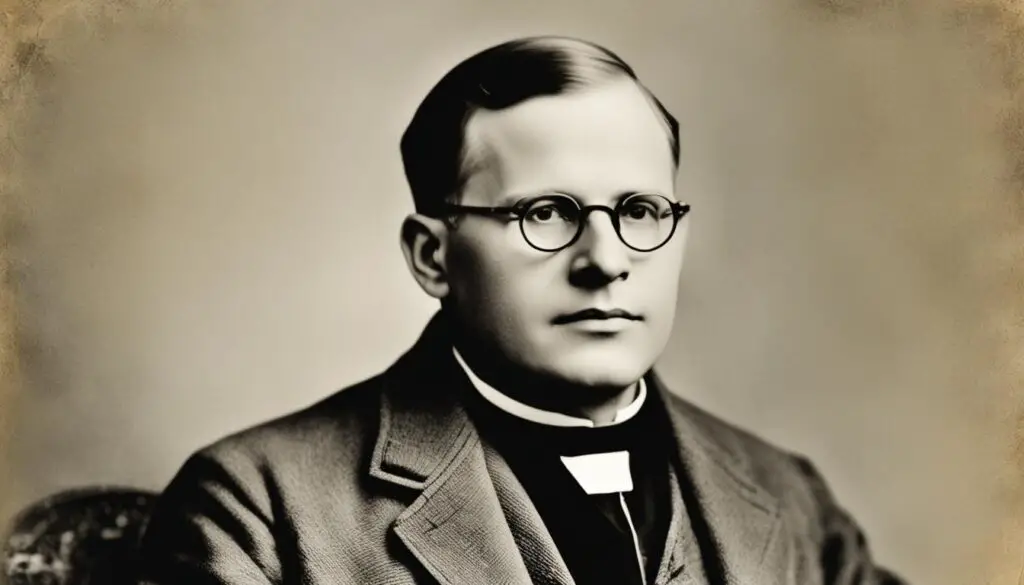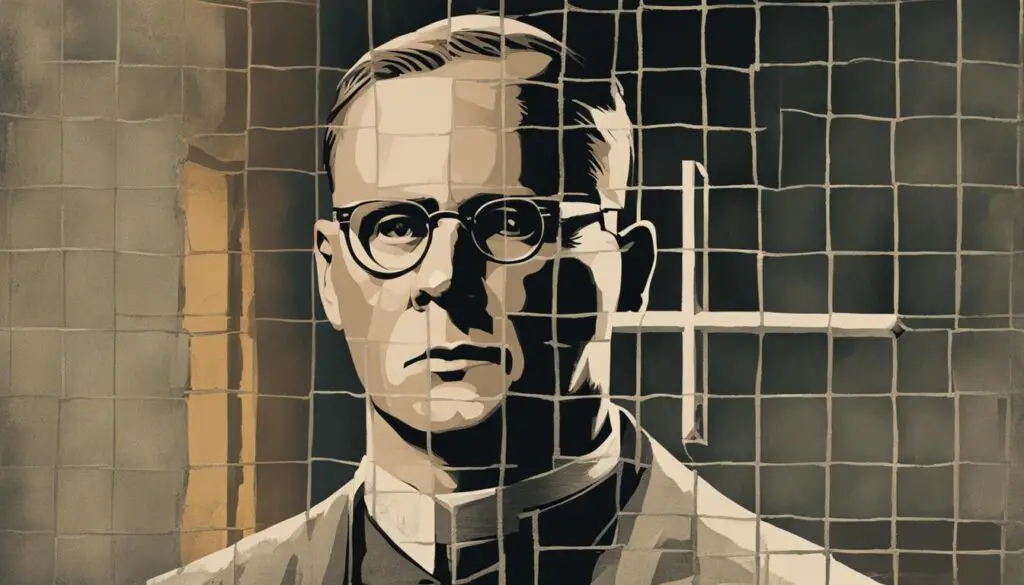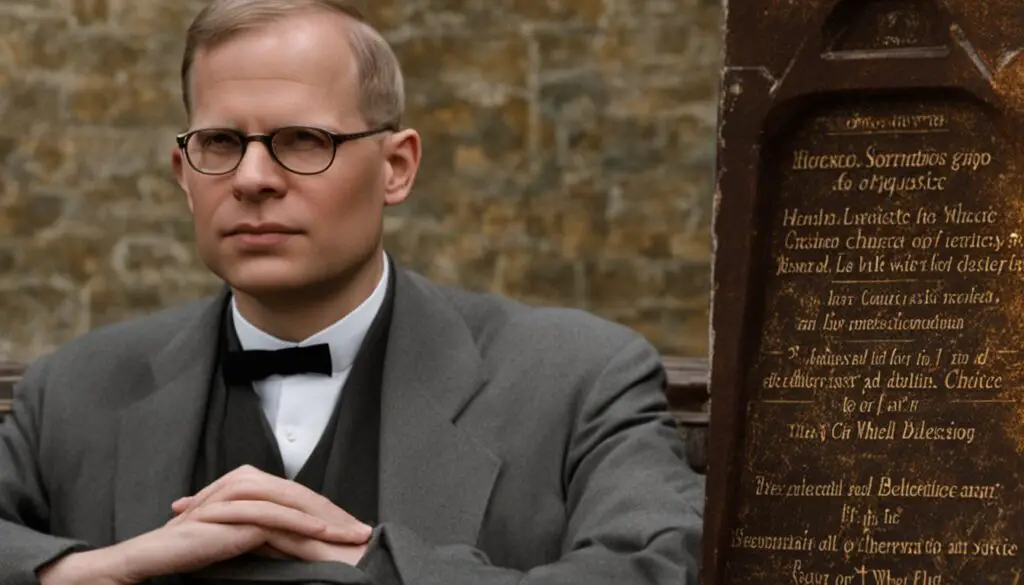Dietrich Bonhoeffer, a German theologian and martyr, is widely recognized as one of the most influential theologians of the modern era. His profound insights and unwavering commitment to justice have left an indelible mark on society. As a pastor, his work was guided by a deep belief in the power of theology to shape and transform the world. Bonhoeffer’s life and teachings continue to inspire individuals around the globe, serving as a powerful reminder of the impact one person can have in the pursuit of truth, love, and justice.
Key Takeaways:
- Bonhoeffer’s theology emphasized the importance of engaging with social issues based on sound theological foundations.
- He fiercely opposed the Nazi regime and spoke out against Hitler, advocating for a Christ-like posture of love even towards one’s enemies.
- Bonhoeffer’s core values included love, grace, discipleship, and personal accountability.
- His writings and teachings continue to inspire theologians, scholars, and individuals seeking guidance in matters of faith and social justice.
- Bonhoeffer’s legacy serves as a reminder of the power of conviction, the importance of love for all humankind, and the call to actively pursue justice in the face of adversity.
The Root of Bonhoeffer’s Ethics: Theology First
Bonhoeffer firmly believed that theology should be the primary basis for engaging with social issues. He emphasized the importance of having correct theology as a prerequisite for meaningful social transformation. Bonhoeffer argued that until the church works out its theology, its engagement with social systems such as politics and economics will be misguided. He saw theology as the key to addressing pressing social issues, such as the rise of Nazism in his time.

“The first service that one owes to others in the fellowship consists in listening to them. Just as love to God begins with listening to His Word, so the beginning of love for the brethren is learning to listen to them.” – Dietrich Bonhoeffer
Bonhoeffer’s Opposition to Nazism
Bonhoeffer emerged as an unwavering opponent of the Nazi regime in Germany during Hitler’s rise to power in the 1930s. He was deeply disturbed by the widespread acceptance of Hitler as the leader among the German evangelical church, recognizing the grave implications of such support. Just two days after Hitler became chancellor, Bonhoeffer boldly spoke out against him, taking a stand against the tyranny and injustice that would come to define the Nazi regime.
Driven by his profound faith and moral conscience, Bonhoeffer considered Hitler and his ideology as direct adversaries. But instead of promoting hatred or violence, he advocated for a Christ-like attitude of love and compassion, even toward one’s enemies. He recognized that love, rather than hate, held the power to transcend boundaries and foster unity, even in the face of extreme opposition.
Bonhoeffer’s opposition to Nazism cemented his place as one of the most prominent resistance figures of his time. He tirelessly fought against the encroaching darkness of fascist ideology, challenging the status quo and inspiring others to join the resistance against Nazi oppression. His unwavering commitment to justice and his steadfast belief in the power of love became beacons of hope in a time of great turmoil and despair.

“Silence in the face of evil is itself evil: God will not hold us guiltless. Not to speak is to speak. Not to act is to act.” – Dietrich Bonhoeffer
Bonhoeffer’s Core Values and Principles
Bonhoeffer’s core values and principles reflect his unwavering commitment to following Christ and living out the teachings of the Gospel. His theology emphasized the inseparability of grace and discipleship, illustrating the transformative power of God’s love in shaping one’s character and actions.
“Costly grace is the treasure hidden in the field; for the sake of it, a person will gladly expend all that they have.”
Bonhoeffer believed in the radical notion of costly grace, which requires a sacrificial response. He understood that genuine discipleship entailed exercising personal accountability and responsibility, even in the face of social injustice. His belief in the transformative nature of grace challenged individuals to embrace a life of active faith, embodying love, compassion, and justice in their interactions with others.
Key Principles
- Love for One’s Enemies: Bonhoeffer upheld the revolutionary command to love one’s enemies, transcending societal norms and prejudices. He recognized that love has the power to dismantle hatred and transform lives.
- Sacrificial Love: Bonhoeffer believed in the power of sacrificial love, echoing the example set by Christ. He saw selflessness as the key to building authentic relationships and contributing to the well-being of society.
- Active Faith: Bonhoeffer’s theology underscored the importance of active faith in addressing social injustice. He challenged believers to move beyond passive observance, urging them to put their faith into action through advocacy, resistance, and fighting for the rights of the marginalized.
- Authentic Discipleship: Bonhoeffer emphasized the significance of authentic discipleship, intertwining faith and obedience. He urged believers to live out their convictions, aligning their lives with the teachings of the Gospel.
By embodying these principles, Bonhoeffer demonstrated a profound understanding of the transformative power of faith. His actions and teachings continue to inspire individuals to embrace grace, exercise love, and actively pursue justice in their respective contexts.

| Principles | Description |
|---|---|
| Love for One’s Enemies | Transcending societal norms and prejudices, Bonhoeffer embraced the command to love one’s enemies, recognizing love’s power to dismantle hatred. |
| Sacrificial Love | Bonhoeffer emphasized the transformative power of sacrificial love, which requires selflessness and a commitment to the well-being of others. |
| Active Faith | He challenged believers to put their faith into action, urging them to actively address social injustice through advocacy, resistance, and fighting for the marginalized. |
| Authentic Discipleship | Bonhoeffer stressed the importance of authentic discipleship, calling believers to align their lives with the teachings of the Gospel and live out their convictions. |
Bonhoeffer’s Impact on Society
Bonhoeffer’s impact on society has been profound and far-reaching, leaving a lasting legacy that continues to inspire and challenge individuals today. His writings and teachings have served as a source of inspiration for countless individuals, sparking important conversations and influencing theological and ethical discourse. Through his unwavering resistance to the Nazi regime and his unwavering commitment to justice and love, Bonhoeffer has become a symbol of courage and moral integrity.
One of the significant ways in which Bonhoeffer has impacted society is through his influence on the church. His teachings and actions have challenged believers to actively live out their faith and engage in the pursuit of social justice. Bonhoeffer believed that the church should be a catalyst for positive change, encouraging believers to address pressing issues and stand up against injustice.
Bonhoeffer’s core values and principles, rooted in his commitment to following Christ and living out the teachings of the Gospel, have shaped his impact on society. He believed in the inseparability of grace and discipleship, emphasizing the importance of love even for one’s enemies. Bonhoeffer’s theology emphasized personal accountability and responsibility in the face of social injustice, inspiring individuals to take action and make a difference in their communities and the world.
With his courageous resistance to the Nazi regime and his unwavering commitment to justice, Bonhoeffer’s influence extends beyond his time. His legacy continues to inspire individuals to stand up against oppression, to champion justice and love, and to actively engage in shaping a better society.

Bonhoeffer’s Key Achievements
Bonhoeffer’s enduring legacy is marked by his remarkable achievements and contributions, which spanned theological writings and active resistance against Hitler’s Nazi regime. His profound impact on society continues to inspire generations, making him a symbol of resilience and moral conviction.
One of Bonhoeffer’s key achievements lies in his influential writings. His books, such as “The Cost of Discipleship” and “Ethics,” have left an indelible mark on theological discourse. These insightful works continue to be widely studied and discussed, offering valuable perspectives on faith, ethics, and the intersection of theology with contemporary social issues.
Furthermore, Bonhoeffer played a pivotal role in the resistance against Hitler and the Nazi regime. He actively participated in the opposition movement, contributing to plans aimed at assassinating Hitler. Bonhoeffer’s courage and unwavering commitment to his beliefs, even in the face of imprisonment and eventual execution, exemplify his remarkable resilience and moral conviction.

Indeed, Bonhoeffer’s writings and his active involvement in the resistance against the Nazi regime demonstrate his courage in standing up for justice and confronting evil. His achievements speak to his unwavering dedication to the principles of faith, love, and sacrifice in the pursuit of a just and equitable society.
Overcoming Challenges: Bonhoeffer’s Journey
Bonhoeffer’s life was marked by numerous challenges, each shaping his remarkable journey. One of the most significant challenges he faced was the rise of Nazism in Germany, which posed a direct threat to his beliefs and values. As a devout pacifist, Bonhoeffer was torn between his commitment to nonviolence and the realization that more direct action might be necessary to confront the evils of the Nazi regime.
This inner conflict forced Bonhoeffer to wrestle with difficult questions and reevaluate his beliefs. It was during this struggle that he began to recognize the complexities of ethical decision-making in the face of extreme injustice. Bonhoeffer’s journey was one of self-discovery and personal growth, as he sought to find the most effective way to resist the Nazi regime without compromising his principles.
Ultimately, Bonhoeffer’s journey led him to embrace a more active form of resistance. He became involved in various plots to assassinate Hitler and actively participated in the opposition movement. In doing so, he demonstrated immense courage and a willingness to confront extraordinary challenges head-on, even at great personal risk.
Bonhoeffer’s ability to overcome these challenges and navigate the complexities of his journey serves as an inspiration to us all. His unwavering commitment to truth and justice propelled him forward, even in the face of adversity. Bonhoeffer’s struggle became a catalyst for personal growth and transformation, demonstrating the power of relentless self-reflection and unwavering conviction.
Bonhoeffer’s Legacy
Bonhoeffer’s legacy is one that continues to resonate and inspire individuals across the globe. His writings, filled with profound insights and timeless wisdom, serve as a guiding light for theologians, scholars, and those seeking guidance in matters of faith and social justice. Bonhoeffer’s impact extends far beyond his lifetime, leaving an indelible mark on the world.
He is remembered as a courageous resistor, unafraid to challenge the status quo and speak truth to power. Bonhoeffer’s unwavering commitment to justice and love, even in the face of immense adversity, made him a beacon of hope in dark times. His influence reaches beyond the religious realm, touching the lives of people from all walks of life who admire his resilience and moral integrity.
One of the core values that Bonhoeffer imparted through his life and work is the power of conviction. He believed that true transformation occurs when individuals have the courage to stand up for what they believe in, especially when faced with opposition. Bonhoeffer’s conviction inspired countless individuals to question the social and political systems that perpetuate injustice and to actively work towards positive change.
“The ultimate test of a moral society is the kind of world it leaves to its children.”
Bonhoeffer’s commitment to love for all humankind is another crucial aspect of his legacy. He emphasized the importance of embracing empathy and compassion, understanding that true change can only come from a place of love. By exemplifying love even towards his enemies, Bonhoeffer showcased the transformative power of compassion and challenged society to reevaluate its approach to conflict and justice.
In the face of adversity, Bonhoeffer actively pursued justice. His legacy serves as a reminder that change requires active engagement and a willingness to confront injustice head-on. By participating in the resistance against the Nazi regime and advocating for love and justice, Bonhoeffer left an indelible mark on society. His courageous actions continue to inspire individuals to make a difference in their communities and the world at large.
In conclusion, Bonhoeffer’s legacy is one of resilience, moral conviction, and a deep commitment to justice and love. His writings and actions continue to resonate, provoking thought and inspiring action in a world that needs courageous voices now more than ever. Bonhoeffer’s legacy challenges us to examine our own convictions, embrace compassion, and actively pursue justice in our lives, leaving behind a lasting impact for future generations to follow.
Lessons from Bonhoeffer’s Example
Bonhoeffer’s life and teachings offer valuable lessons for individuals seeking to make a difference in their communities and the world. His unwavering commitment to living out his faith and his relentless pursuit of justice serve as a powerful example.
One of the key lessons we can learn from Bonhoeffer is the importance of standing up for justice, even in the face of opposition. Despite the risks and challenges, Bonhoeffer never wavered in his belief that it was necessary to confront the evils of his time. His example reminds us that we have a responsibility to actively engage in addressing injustice and promoting equality.
Bonhoeffer’s commitment to love and grace is another valuable lesson we can glean from his example. He understood that love was not just a feeling but a call to action. He believed in extending love and grace even to those who opposed him, recognizing that it was through love that true transformation could occur.
“Only the suffering God can help.”
This quote from Bonhoeffer highlights his deep conviction that true transformation and justice can only come through a God who was willing to suffer for humanity. It serves as a reminder that our actions, no matter how small, have the potential to make a significant impact when motivated by love and guided by a higher purpose.
Another lesson we can learn from Bonhoeffer’s example is the power of individual action. Despite the immense challenges he faced, Bonhoeffer never underestimated the impact that one person’s convictions can have on society. His bravery and unwavering commitment to justice continue to inspire individuals to this day.
“The ultimate test of a moral society is the kind of world that it leaves to its children.”
This image showcases Bonhoeffer’s dedication to leaving behind a better world for future generations. It is a powerful representation of his teachings and the impact his example can have on society.
By following Bonhoeffer’s teachings and emulating his example, we can shape a better future that is rooted in justice, love, and grace. His legacy serves as a reminder of the transformative power of individual action and the potential for change that lies within each of us.
Bonhoeffer’s Books and Quotes
Bonhoeffer’s writings have left an indelible mark on theology, ethics, and social justice. His books, including “The Cost of Discipleship” and “Ethics,” are revered for their profound insights and thought-provoking perspectives. In these works, Bonhoeffer skillfully navigates the intersections of faith, activism, and the pursuit of justice.
“The Cost of Discipleship” challenges readers to embody the teachings of Christ in their everyday lives, emphasizing the inseparable nature of discipleship and grace. Bonhoeffer encourages believers to take up their crosses and follow Christ, even when faced with great opposition or sacrifice. This book serves as a powerful reminder of the high calling of discipleship and the transformative power of costly grace.
In “Ethics,” Bonhoeffer examines the moral complexities of navigating a world fraught with injustice and evil. He explores the ethical implications of living out one’s faith and the responsibility of individuals to actively engage in shaping a more just society. His insightful reflections on topics such as love, integrity, and the interplay between personal faith and social action continue to resonate with readers today.
“When Christ calls a man, he bids him come and die.”
This iconic quote from Bonhoeffer encapsulates the depth and strength of his convictions. It serves as a clarion call to live out one’s faith fearlessly, embracing a path of self-sacrifice and unwavering commitment to Christ. These words inspire individuals to rise above complacency, count the cost of discipleship, and embark on a transformative journey of faith.
Bonhoeffer’s books and quotes continue to inspire and challenge individuals to live out their faith with courage and conviction. They invite readers to delve deeper into the complexities of theology, ethics, and social justice, encouraging meaningful reflection and action.
Bonhoeffer and the Church
Bonhoeffer’s impact on the church is profound. His emphasis on living out the teachings of the Gospel and actively engaging in social justice challenges believers to move beyond mere words and rituals. Bonhoeffer’s example calls the church to be a force for justice and love in the world, encouraging believers to examine their theology and take action to address societal issues. His ideas continue to shape the church’s understanding of its role in the world.
One of Bonhoeffer’s key contributions to the church was his call for a theology that goes beyond intellectual pursuits and engages with the realities of the world. He believed that the church should not remain confined within its walls but should actively seek to bring about change and transformation in society. Bonhoeffer’s emphasis on social justice and the Gospel’s message of love resonates with many Christians, challenging them to live out their faith in tangible ways.
“The church is the church only when it exists for others… not dominating, but helping and serving.” – Dietrich Bonhoeffer
Bonhoeffer’s teachings on the church as a servant community have had a lasting impact. He believed that the church should be a place of refuge for the marginalized and a source of hope for the oppressed. Bonhoeffer’s emphasis on serving others and being a voice for justice challenges the church to be actively engaged in addressing the pressing issues of our time.
Furthermore, Bonhoeffer’s emphasis on discipleship has influenced the church’s understanding of what it means to follow Christ. He emphasized the need for personal transformation and a commitment to living out the teachings of Jesus. Bonhoeffer believed that discipleship should not be seen as an optional add-on to faith but as an essential part of being a Christian. His call to costly grace and sacrificial love continues to inspire believers to live lives aligned with the Gospel.
In conclusion, Bonhoeffer’s impact on the church is undeniable. His teachings challenge believers to move beyond complacency and engage with the world around them. Bonhoeffer’s emphasis on the Gospel’s message of love, justice, and discipleship continues to shape the church’s understanding of its mission and role in society. His example serves as a reminder that as followers of Christ, we are called to be agents of change and advocates for those in need.
Conclusion
Dietrich Bonhoeffer’s life and work are a testament to the power of personal conviction and the potential impact of one individual’s actions. As a theologian, pastor, and martyr, Bonhoeffer’s unwavering commitment to justice, love, and discipleship continues to inspire and challenge people around the world.
Throughout his life, Bonhoeffer faced numerous challenges, including the rise of Nazism in Germany. He grappled with the tension between his pacifist beliefs and the realization that more direct action might be necessary to confront evil. Bonhoeffer’s courage and resilience in navigating these challenges reflect his deep commitment to wrestling with difficult questions and seeking truth and justice.
Bonhoeffer’s legacy is far-reaching. His influential writings, such as “The Cost of Discipleship” and “Ethics,” continue to be studied and discussed today. His ideas and principles, rooted in his theology and faith, challenge believers to actively engage in social justice issues and live out the teachings of the Gospel.
By embracing Bonhoeffer’s example, we can learn valuable lessons about the importance of standing up for justice and love, even when faced with opposition. His life reminds us of the power of individual action and the potential impact that one person’s convictions can have on society. Through his writings, accomplishments, and enduring legacy, Dietrich Bonhoeffer continues to inspire us to make a difference in the world.
FAQ
Who was Dietrich Bonhoeffer?
Dietrich Bonhoeffer was a German theologian and martyr who is widely recognized as one of the most influential theologians of the modern era.
What were Bonhoeffer’s core values and principles?
Bonhoeffer’s core values and principles included following Christ, living out the teachings of the Gospel, and emphasizing the inseparability of grace and discipleship. He also believed in the importance of love for one’s enemies and personal accountability in the face of social injustice.
What was Bonhoeffer’s stance on the Nazi regime?
Bonhoeffer was an outspoken opponent of the Nazi regime in Germany. He spoke out against Hitler just two days after he became chancellor and actively participated in the resistance movement against the regime.
What impact did Bonhoeffer have on society?
Bonhoeffer’s impact on society is far-reaching. His writings and teachings have inspired countless individuals and influenced theological and ethical discourse. He is also remembered as a symbol of courage and moral integrity for his unwavering resistance to the Nazi regime.
What were Bonhoeffer’s key achievements?
Bonhoeffer’s key achievements include his influential writings, such as “The Cost of Discipleship” and “Ethics,” which continue to be widely studied and discussed. He also played a pivotal role in the resistance against Hitler and actively participated in plans to assassinate him.
What challenges did Bonhoeffer face?
Bonhoeffer faced numerous challenges, including the rise of Nazism in Germany and his own internal conflict over the use of violence in resisting injustice. He grappled with difficult questions and continuously sought truth and justice.
What is Bonhoeffer’s legacy?
Bonhoeffer’s legacy is multifaceted and enduring. His unwavering commitment to justice, love, and discipleship makes him a symbol of moral integrity and courage. His writings and teachings continue to inspire individuals and shape theological understanding and practice.
What lessons can we learn from Bonhoeffer’s example?
Bonhoeffer’s example teaches us the importance of living out our faith and standing up for justice, even in the face of opposition. His commitment to love, grace, and discipleship serves as a model for making a difference in the world.
Did Bonhoeffer write any books?
Yes, Bonhoeffer wrote several books, including “The Cost of Discipleship” and “Ethics.” These works explore the intersections of theology, ethics, and social justice.
What was Bonhoeffer’s impact on the church?
Bonhoeffer’s influence on the church is profound. His emphasis on living out the teachings of the Gospel and actively engaging in social justice challenges believers to move beyond superficial faith and rituals. His ideas continue to shape the church’s understanding of its role in the world.


Hey, I’m Natalie from Social Buzzzy here. I’ve come across a revolutionary tool for Instagram engagement and had to share it with you!
Social Growth Engine presents an incredible tool that boosts Instagram engagement. It’s easy:
– Just focus on creating fantastic content.
– Cost-effective at under $36/month.
– Secure, powerful, and compliant with Instagram.
Witnessing amazing results, and I know you will too! Elevate your Instagram game today: http://get.socialbuzzzy.com/instagram_booster
Here’s to your success,
Natalie from Social Buzzzy
Do you have a spam issue on this blog; I also am a blogger, and I was wondering your situation; we have developed some nice practices and we are looking to exchange strategies with others, why not shoot me an e-mail if interested.
Hi, Natalie from Social Buzzzy here. I’ve discovered a breakthrough for Instagram success and had to share it with you!
Social Growth Engine offers an extraordinary tool that elevates Instagram engagement. It’s easy:
– Keep focusing on creating amazing content.
– Cost-effective at under $36/month.
– Reliable, powerful, and compliant with Instagram.
Having seen incredible results, and I am confident you will too! Upgrade your Instagram game right away: http://get.socialbuzzzy.com/instagram_booster
Here’s to your success,
Natalie
Hi, I’m Natalie from Social Buzzzy here. I’ve discovered a revolutionary tool for Instagram engagement and had to share it with you!
Social Growth Engine presents an amazing tool that skyrockets Instagram engagement. It’s easy:
– Focus on making fantastic content.
– Economical at less than $36/month.
– Reliable, efficient, and compliant with Instagram.
I’ve seen fantastic results, and I know you will too! Elevate your Instagram game right away: http://get.socialbuzzzy.com/instagram_booster
Cheers your success,
Natalie